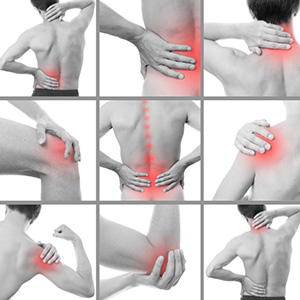
Chronic pain is the most reported qualifying condition for medical marijuana programs across the country (an estimated 64.2% amongst states who release data). Not only are a large portion of medical marijuana patients medicating for chronic pain, they are also lowering prescription pain medication use, and in some cases dropping prescription pain medication altogether.Degenerative disc disease is one of the most common causes of low back and neck pain, and also one of the most misunderstood. More than 14,000 Americans died in 2014 from unintentional overdose of prescription opioids, making this the leading cause of death among younger individuals in many states, according to the Centers for Disease Control and Prevention.”
“The Institute of Medicine estimates chronic pain affects 100 million Americans at an annual cost of $600 billion.”
There is surmounting evidence that medical marijuana is a safe, and efficient alternative for relieving back pain/spinal injury related pain. “A recent research project at the University of Colorado’s Spine Center looked at 200 patients suffering from degenerative disc problems and other back pains. Of the participants that consumed marijuana, 89% said “it greatly or moderately relieved their pain, and 81% said it worked as well as or better than narcotic painkillers.” Participants in the study that consumed marijuana used it “no more than one or two times a day.”
“The United States constitutes less than 5 percent of the world’s population, and we consume 80 percent of the world’s opioid supply. Simply put, degenerative disc disease refers to symptoms of back or neck pain caused by wear-and-tear on a spinal disc. In some cases, degenerative disc disease also causes weakness, numbness, and hot, shooting pains in the arms or legs (radicular pain) say Marijuana Doctors in Florida. Degenerative disc disease typically consists of a low-level chronic pain with intermittent episodes of more severe pain. Painful disc degeneration is common in the neck (cervical spine) and lower back (lumbar spine). These areas of the spine undergo the most motion and stress, and are most susceptible to disc degeneration. The term degenerative understandably implies that symptoms will get worse with age. However, the term does not refer to the symptoms, but rather describes the process of the disc degenerating over time. Despite what the name suggests, degenerative disc disease is not a disease, but a condition in which natural, age-related wear-and-tear on a disc causes pain, instability, and other symptoms. This condition usually does not result in long-term disability, and most cases can be managed using non-surgical treatment methods. While it is true that disc degeneration is likely to progress over time, the pain from degenerative disc disease usually does not get worse and in fact usually feels better given enough time. Disc degeneration is a natural part of aging, and over time everybody will exhibit some changes in their discs. However, a degenerating disc does not always cause symptoms to develop. In fact, degenerative disc disease is quite variable in its nature and severity. This article provides in-depth information about aspects of degenerative disc disease based on commonly accepted principles, such as how a degenerated disc causes pain and common symptoms and treatments. There is little consensus in the medical literature regarding what does and does not constitute a diagnosis of degenerative disc disease. This lack of agreement may be attributable to the condition’s nature of causing symptoms off and on over the span of many years, making symptoms difficult to track. It is important to note that disc degeneration can lead to or hasten the onset of additional spinal conditions, such as: Spinal Stenosis: Spinal stenosis, a form of spinal degeneration that leads to nerve root or spinal cord pinching.
If you or someone you know has back pain, please contact our office today to get qualified and get started on medical marijuana in Florida.

